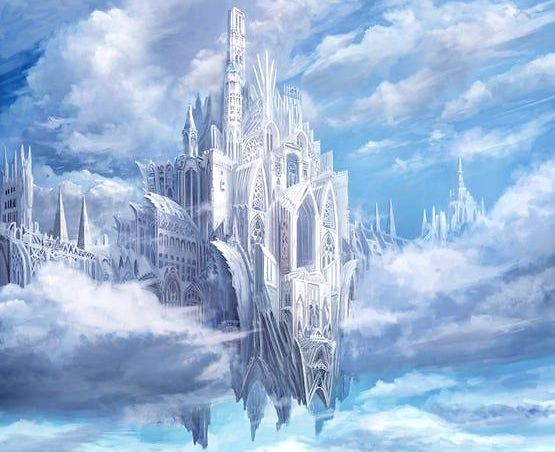

In the Material Forest, the Conditioned Soul
Sometimes
Contemplates Imaginary Great Castles and Skyscrapers.
This material world is like a great forest in which one becomes entangled due to association with material life.
Talks Between King Rahūgaṇa and Jaḍa Bharata: "The brāhmaṇa Jaḍa Bharata became very kind to King Rahūgaṇa, and to disassociate him from the material world, he spoke figuratively of the forest of the material world. He explained that this material world is like a great forest in which one becomes entangled due to association with material life."
In this forest there are plunderers (the six senses) as well as carnivorous animals like jackals, wolves and lions (wife, children and other relatives) who are always anxious to suck the blood from the head of the family. The forest plunderers and the carnivorous blood-sucking animals combine to exploit the energy of a man within this material world. In this forest there is also a black hole, covered by grass, into which one may fall.

Coming into the forest and being captivated by so many material attractions, one identifies himself with this material world, society, friendship, love and family. Having lost the path and not knowing where to go, being harassed by animals and birds, one is also victimized by many desires. Thus one works very hard within the forest and wanders here and there. He becomes captivated by temporary happiness and becomes aggrieved by so-called distress. Actually one simply suffers in the forest from so-called happiness and distress.
Sometimes he is attacked by a snake (deep sleep), and due to the snakebite he loses consciousness and becomes puzzled and bewildered about discharging his duties. Sometimes he is attracted by women other than his wife, and thus be thinks he enjoys extramarital love with another woman. He is attacked by various diseases, by lamentation and by summer and winter. Thus one within the forest of the material world suffers the pains of material existence.
Expecting to become happy, the living entity changes his position from one place to another, but actually a materialistic person within the material world is never happy. Being constantly engaged in materialistic activities, he is always disturbed. He forgets that one day he has to die. Although he suffers severely, being illusioned by the material energy, he still hankers after material happiness. In this way he completely forgets his relationship with the Supreme Personality of Godhead.
GANDHARVA-PURAM- AN IMAGINARY CITY
Sometimes, being defeated or plundered by a superior, powerful agent, a living entity loses all his possessions. He then becomes very morose, and lamenting their loss, he sometimes becomes unconscious. Sometimes he imagines a great palatial city in which he desires to live happily with his family members and riches. He thinks himself fully satisfied if this is possible, but such so-called happiness continues only for a moment.
The word gandharva-puram is very significant in this verse. Sometimes in the forest a very big castle appears, and this is called a castle in the air. Actually this castle does not exist anywhere but in one’s imagination. This is called gandharva-pura.
In the material forest, the conditioned soul sometimes contemplates great castles and skyscrapers, and he wastes his energy for such things, hoping to live in them very peacefully with his family forever. However, the laws of nature do not allow this. When he enters such castles, he temporarily thinks that he is very happy, even though his happiness is impermanent. His happiness may last for a few years, but because the owner of the castle has to leave the castle at the time of death, everything is eventually lost. This is the way of worldly transactions.

Such happiness is described by Vidyāpati as the happiness one derives upon seeing a drop of water in the desert. The desert is heated by scorching sunshine, and if we want to reduce the desert temperature, we need huge amounts of water—millions and millions of gallons. What effect will one drop have? Water certainly has value, but one drop of water cannot reduce the heat of the desert. In this material world everyone is ambitious, but the heat is very scorching. What will an imaginary castle in the air do to help?
Śrīla Vidyāpati has therefore sung: tāṭala saikate, vāri-bindu-sama, suta-mita-ramaṇi-samāje.
The happiness of family life, friends and society is compared to a drop of water in the scorching desert. The entire material world is busy trying to attain happiness because happiness is the prerogative of the living being. Unfortunately, due to falling in contact with the material world, the living entity simply struggles for existence.
Even if one becomes happy for a while, a very powerful enemy may plunder everything. There are many instances in which big businessmen suddenly become paupers in the street. Yet the nature of material existence is such that foolish people are attracted to these transactions and they forget the real business of self-realization.
Fifth Canto, Thirteenth Chapter, of the Śrīmad-Bhāgavatam, entitled, “Further Talks Between King Rahūgaṇa and Jaḍa Bharata.” Text 7
LOITERING IN THE FOREST OF MATERIAL EXISTENCE
Sometimes the living entity in the forest of material existence takes shelter of creepers and desires to hear the chirping of the birds in those creepers. Being afraid of roaring lions in the forest, he makes friends with cranes, herons and vultures.

In the forest of the material world there are many animals and birds, trees and creepers. Sometimes the living entity wants to take shelter of the creepers; in other words, he wants to be happy by being embraced by the creeperlike arms of his wife. Within the creepers there are many chirping birds; this indicates that he wants to satisfy himself by hearing the sweet voice of his wife.
In old age, however, he sometimes becomes afraid of imminent death, which is compared to a roaring lion. To save himself from the lion’s attack, he takes shelter of some bogus svāmīs, yogīs,incarnations, pretenders and cheaters. Being misled by the illusory energy in this way, he spoils his life. It is said, hariṁ vinā mṛtiṁ na taranti: no one can be saved from the imminent danger of death without taking shelter of the Supreme Personality of Godhead. The word hari indicates the lion as well as the Supreme Lord. To be saved from the hands of Hari, the lion of death, one must take shelter of the supreme Hari, the Supreme Personality of Godhead.
People with a poor fund of knowledge take shelter of nondevotee cheaters and pretenders in order to be saved from the clutches of death. In the forest of the material world, the living entity first of all wants to be very happy by taking shelter of the creeperlike arms of his wife and hearing her sweet voice. Later, he sometimes takes shelter of so-called gurus and sādhus who are like crane, herons and vultures. Thus he is cheated both ways by not taking shelter of the Supreme Lord.
THE DARK FORREST OF MATERIAL LIFE
Being cheated by them, the living entity in the forest of the material world tries to give up the association of these so-called yogīs, svāmīs and incarnations and come to the association of real devotees, but due to misfortune he cannot follow the instructions of the spiritual master or advanced devotees; therefore he gives up their company and again returns to the association of monkeys who are simply interested in sense gratification and women. He derives satisfaction by associating with sense gratifiers and enjoying sex and intoxication. In this way he spoils his life simply by indulging in sex and intoxication. Looking into the faces of other sense gratifiers, he becomes forgetful and thus approaches death.
Sometimes a foolish person becomes disgusted with bad association and comes to the association of devotees and brāhmaṇas and takes initiation from a spiritual master. As advised by the spiritual master, he tries to follow the regulative principles, but due to misfortune he cannot follow the instructions of the spiritual master. He therefore gives up the company of devotees and goes to associate with similar people who are simply interested in sex and intoxication.
Those who are so-called spiritualists are compared to monkeys. Outwardly, monkeys sometimes resemble sādhus because they live naked in the forest and pick fruits, but their only desire is to keep many female monkeys and enjoy sex life. Sometimes so-called spiritualists seeking a spiritual life come to associate with Kṛṣṇaconscious devotees, but they cannot execute the regulative principles or follow the path of spiritual life. Consequently they leave the association of devotees and go to associate with sense gratifiers, who are compared to monkeys. Again they revive their sex and intoxication, and looking at one another’s faces, they are thus satisfied. In this way they pass their lives up to the point of death.

When the living entity becomes exactly like a monkey jumping from one branch to another, he remains in the tree of household life without any profit but sex. Thus he is kicked by his wife just like the he-ass. Unable to gain release, he remains helplessly in that position. Sometimes he falls victim to am incurable disease, which is like falling into a mountain cave. He becomes afraid of death, which is like the elephant in the back of that cave, and he remains stranded, grasping at the twigs and branches of a creeper.
The precarious condition of a householder’s life is described herein. A householder’s life is full of misery, and the only attraction is sex with the wife who kicks him during sexual intercourse, just as the she-ass does her mate. Due to continuous sex life, he falls victim to many incurable diseases. At that time, being afraid of death,
O killer of enemies, Mahārāja Rahūgaṇa, if the conditioned soul somehow or other gets out of his dangerous position, he again returns to his home to enjoy sex life, for that is the way of attachment. Thus, under the spell of the Lord’s material energy, he continues to loiter in the forest of material existence. He does not discover his real interest even at the point of death.
This is the way of material life. When one is captured by sexual attraction, he becomes implicated in so many ways and cannot understand the real aim of life. Therefore Śrīmad-Bhāgavatam (7.5.31) says, na te viduḥ svārtha-gatiṁ hiviṣṇum: generally people do not understand the ultimate goal of life. As stated in the Vedas, oṁ tad viṣṇoḥ paramaṁpadaṁ sadā paśyanti sūrayaḥ: those who are spiritually advanced simply look to the lotus feet of Viṣṇu. The conditioned soul. however, not being interested in reviving his relationship with Viṣṇu, becomes captivated by material activities and remains in everlasting bondage, being misled by so-called leaders.
Fifth Canto, Thirteenth Chapter, of the Śrīmad-Bhāgavatam, entitled, “Further Talks Between King Rahūgaṇa and Jaḍa Bharata.” Text 16-19
Compiled by Mohini Devi